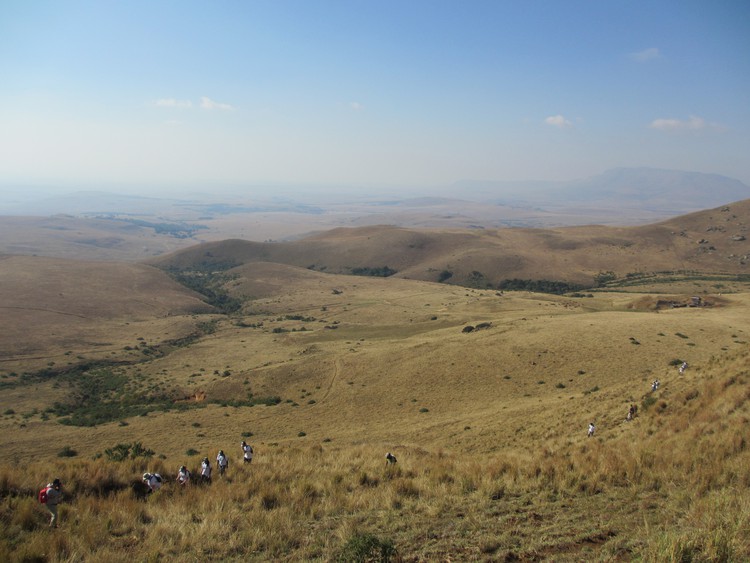Water tribunal dismisses appeal against Mpumalanga coal mine licence
Setback for environmental groups, but there are many obstacles to clear before mining can proceed
The Water Tribunal has rejected an appeal by environmental and agricultural groups against the granting of a water use licence for a proposed underground coal mine in a highly water-sensitive area of the Mpumalanga grasslands.
Despite strong opposition from the environmental sector and some civic interests, the Department of Water Affairs issued the licence in July 2016 to Atha-Africa Ventures, the South African subsidiary of the India-based Atha Group.
The company has acquired five farms covering about 8,360 hectares in the Mabola region near Wakkerstroom where it wants to develop an underground coal mine.
The proposed underground mine will extend about 1,200ha, with a potential to produce 2.2 million tons of coal per year over an estimated 15 years. All five farms are within a high-altitude grassland biome with a threatened grassland ecosystem. Water bodies that will be affected include streams, rivers, springs, and wetlands of various kinds.
The underground operations will be within the 8,772ha Mabola Protected Environment, that was declared in January 2014 along with four other wetland areas in Mpumalanga that provide water for South Africa’s economic heartland in Gauteng, as well as to neighbouring Swaziland and Mozambique.
The proposed mine also falls inside the Enkangala Drakensberg Strategic Water Source Area, one of 22 areas recognised as collectively providing more than 50 percent of the country’s freshwater.
The water use licence grants Atha-Africa the right to use water for the mine, subject to conditions that included mitigation measures to prevent pollution; the monitoring and reporting on underground water pollution; and post-mining rehabilitation measures until the water quality stabilises. This process could take until the end of this century, according to those opposing the mine.
Lengthy appeal
The issuing of the licence was appealed by two environmental organisations – the Endangered Wildlife Trust and the Federation for a Sustainable Environment – and Mpumalanga Landbou/Agriculture, the provincial affiliate of AgriSA that hosts 35 farmers’ associations across Mpumalanga. The respondents were the Director-General of the national Department of Water and Sanitation and Atha-Africa Ventures.
The Water Tribunal is an independent statutory body that hears appeals against directives and decisions made in terms of the National Water Act. Members, who must have specialist knowledge, are proposed by the Water Research Commission and the Judicial Services Commission, and are appointed by the Minister of Water.
The three-person panel that heard the Yzermyn appeal was headed by Professor Tumai Murombo, a law professor at Wits University and former director of the Mandela Institute of Law.
After a lengthy hearing of four sessions in 2018, the Tribunal dismissed the appeal on 22 May 2019. In its appeal decision, the Tribunal stated that the appellants had acknowledged the constitutional imperative of justifiable ecologically sustainable socio-economic development, but had argued that, in this case, the economic opportunities offered by the proposed coal mine “paled into insignificance” when compared to the environmental costs of approving its water use licence.
The respondents “think and argue otherwise”, the Tribunal said and added that it was “common cause” that the proposed mine would result in a degree of contamination of both groundwater and surface water. Those opposing disagreed on the degree of contamination and on what would constituted sufficient mitigation measures.
The Tribunal found that water-related impacts such as dewatering (pumping water from the mine during operations), decant and seepage of waste water were “manageable” and that mitigation measures proposed by Atha-Africa were “reasonable and technically adequate”.
It acknowledged that there had to be adequate financial provision to implement such mitigation measures, possibly over many years. Atha-Africa then had to show proof of adequate financial guarantees for the rehabilitation of damage caused by the coal mining.
Within 60 days of the Tribunal’s ruling, and before any mining starts, the Department of Water Affairs has to review whether these guarantees are adequate and, if necessary, require Atha-Africa to provide further financial security.
Also, the statutory two-year review of the water use licence has to include a review by the Department of the adequacy of the financial provision made for post-closure water treatment and remediation.
Path not clear for mining … yet
But the appeal dismissal does not mean that the Yzermyn coal mine can now go ahead, because it also requires a raft of other statutory approvals.
In November 2018, the Pretoria High Court set aside the approvals given for Yzermyn inside a declared protected area by former ministers the late Edna Molewa and Mosebenzi Zwane, with cost orders against them both.
Atha-Africa’s appeal against that decision was turned down by the Pretoria High Court in January, and again by the Supreme Court of Appeal in April.
In order to start mining, Atha-Africa still needs new approvals from the ministers of Environmental Affairs and Mineral Resources.
The Endangered Wildlife Trust and the Federation for a Sustainable Environment are considering bringing a High Court review application of the Water Tribunal’s decision.
Support independent journalism
Donate using Payfast

Don't miss out on the latest news
We respect your privacy, and promise we won't spam you.
Next: ANC ‘will take up DA offer’
Previous: F-bomb businessman was ordered to pay R30k for unfair dismissal. Seven months later he hasn’t paid
© 2019 GroundUp.
This article is licensed under a Creative Commons Attribution-NoDerivatives 4.0 International License.
You may republish this article, so long as you credit the authors and GroundUp, and do not change the text. Please include a link back to the original article.

